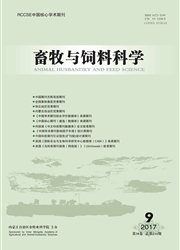

 中文摘要:
中文摘要:
旨在研究Wnt信号通路对绵羊卵泡颗粒细胞增殖及雌激素分泌的影响,探究其是否与促卵泡素(Follicular stimulating hormone,FSH)有关。在添加有FSH以及不同浓度Wnt信号通路抑制剂IWR-1的培养基中培养绵羊卵巢卵泡颗粒细胞168h,利用Guava ViaCount Reagent测定细胞数目的变化,利用绵羊ELISA试剂盒检测雌激素浓度的变化,利用qRT-PCR检测FSH靶基因CYP19和CCND2的相对表达量差异。结果表明,无论有无FSH,抑制剂IWR-1使颗粒细胞数目显著减少(P〈0.05);当有FSH时,抑制剂IWR-1的添加导致雌激素浓度显著降低(P〈0.05)。IWR-1的浓度为1.0μmol·L^-1时,对颗粒细胞的抑制效果最明显。IWR-1还导致CYP19和CCND2mRNA的表达量降低。综上表明,Wnt信号通路对绵羊卵泡颗粒细胞的生物学功能具有促进作用,并且这种促进作用可能与FSH有关。
 英文摘要:
英文摘要:
This study aims to investigate the effect of Wnt signaling pathway on proliferation and estrogen secretion of sheep granulosa cells and to explore whether the effect was related to FSH(Follicular stimulating hormone,FSH).With or without FSH,sheep granulosa cells were cultured in medium with different concentrations of Wnt signaling pathway inhibitor IWR-1for 168 h.Then,Guava ViaCount?Reagent was used to detect the changes of cell number and sheep ELISA kit was used to detect the changes of estrogen concentrations.The relative expression of CYP19 and CCND2,which are the target genes of FSH,was analyzed by qRT-PCR.The results showed that IWR-1could cause a significant(P〈0.05)reduction in the number of granule cells whether FSH existed or not.With the presence of FSH,the addition of IWR-1could significantly(P〈0.05)decrease estrogen concentration.When the concentration of IWR-1 was 1.0μmol·L^-1,its inhibitory effect on granulosa cells was of most obvious.Besides,IWR-1decreased the abundance of CYP19 mRNA and CCND2 mRNA.In conclusion,Wnt signaling pathway canimprove the biological function of sheep granulosa cells,and this function may be related to FSH.
 同期刊论文项目
同期刊论文项目
 同项目期刊论文
同项目期刊论文
 期刊信息
期刊信息
